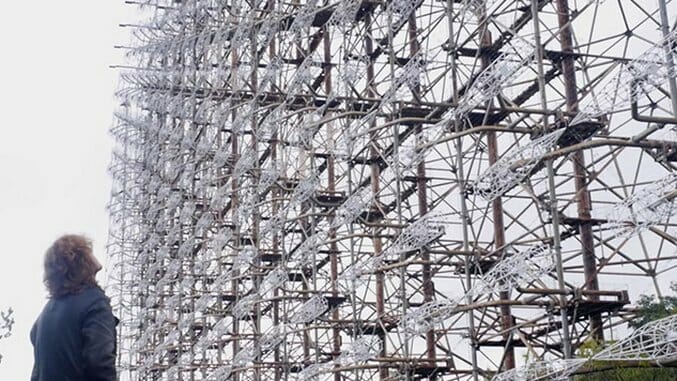The Russian Woodpecker

As far as unconvincing arguments go, The Russian Woodpecker is as sleek as they come. Chad Gracia’s documentary resonates with creativity, suspense and intrigue as it explores doubts and suspicions that surround the Chernobyl nuclear disaster of 1986—but mixed in with all its fascinating information and well-argued points is an unearned sense of grandiosity. As the filmmakers try to tie together the threads of the Chernobyl disaster, cold war paranoia and the modern conflict between Russia and Ukraine, its knots start to slip.
The film predominantly follows Fedor Alexandrovich, a multimedia artist in Kiev who works in theater, film and any other form that suits his fancy. Gracia casts this eccentric man as the wild-eyed hero of his real-life detective story, but Alexandrovich doesn’t claim to be anything of the sort: “I’m not a prosecutor, I’m not a journalist, I’m just a person,” he says. A good journalist’s skepticism might have helped him hone his theories a bit, but that hasn’t stopped him from obsessively researching the Chernobyl catastrophe and its connection to the so-called “Russian woodpecker.”
The titular phrase refers to a radio signal that helped fuel the red scare in the 1980s. Containing a constant tapping noise, the signal was eventually traced back to Chernobyl’s Duga radar system, a mysterious, towering structure of metal beams. While the Russian woodpecker was actually an over-the-horizon radar system designed to detect incoming missiles, speculation at the time translated the transmission as all manner of sinister communist schemes. Some called it a weather-control device, others thought it was part of a brainwashing plot. Alexandrovich of course believes that the Duga system is linked to the Chernobyl disaster—namely, that the nuclear reactor was purposefully blown to cover up the radar system’s functional failings. Duga cost $7 billion, and the penalty for wasting so much government money could have been death.
-

-

-

-

-

-

-

-

-

-

-

-

-

-

-

-

-

-

-

-

-

-

-

-

-

-

-

-

-

-

-

-

-

-

-

-

-

-

-

-








































